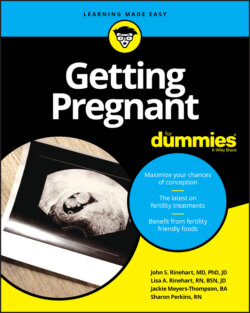Читать книгу Getting Pregnant For Dummies - Sharon Perkins - Страница 129
Changes in health
ОглавлениеAs with primary infertility, your overall health does make a difference. While you may still be living the clean life, it doesn’t mean that your body hasn’t undergone changes all its own. Have you had an increase or decrease in your weight? As we discuss in detail in Chapter 9, BMI (body mass index) can certainly play a part in your fertility or lack thereof. Have you suddenly become a marathon or long-distance runner? This too can affect your metabolism and your body’s responses, including the reproductive ones. While these can be positive health changes, they can also upset the delicate balance to which your body may be clinging. Take a look at any lifestyle changes, good or bad, and discuss them with your physician to see if therein lies the culprit.
Occult, or not yet uncovered, chronic or acute illness can also play a role in reversing your fertility. Diabetes, autoimmune disease such as lupus, thyroid problems, and a host of other issues, large and small, can also affect your ability to conceive and may be brewing without your knowledge. If you haven’t had a complete physical workup, as well as a gynecological one, now would be the time.
Are you fresh from your first, or last, pregnancy? Still breastfeeding? Or burning the midnight oil trying to rock Junior to sleep? Again, even subtle changes such as a shift in your sleep patterns can wreak havoc on your system, which can leave your fertility in less than fighting shape.
Another thing to consider and discuss with your OB/GYN is any lasting effects from your previous pregnancy(ies). Could you have developed adhesions as a result of a caesarian section? While it is possible to develop adhesions, this is relatively uncommon. One study reviewed the literature and reported a 10 percent increase in infertility after a C-section. However, if the delivery was complicated, then subsequent pregnancies may be difficult. For example, retained placenta requiring a D&C, especially if there was an infection, may cause uterine scarring. Did you have problems with excessive bleeding that may indicate unresolved issues? Make sure that you check out as normal from your last foray into baby making before jumping into the next.
The other large category of problems in secondary infertility is the status of the pelvic organs: Are you having abnormal bleeding (especially between periods) that may be indicative of a fibroid or a polyp in your uterus? Have you had any kind of abdominal surgery since your last delivery (appendectomy, gall bladder surgery, ovarian cyst removal)? All surgery is associated with a risk of scarring (adhesions), which may either block the fallopian tubes or pull them away from the ovaries so that they cannot pick up the ovulated eggs. The good news is that all of these conditions can be identified with the use of appropriate diagnostic tests that your doctor can order.
Throughout the process of secondary infertility, make it a point to take optimal care of yourself through nutrition, rest, and exercise. You will need to be in tiptop shape to handle children in multiple forms; this would be a good time to start the process.
